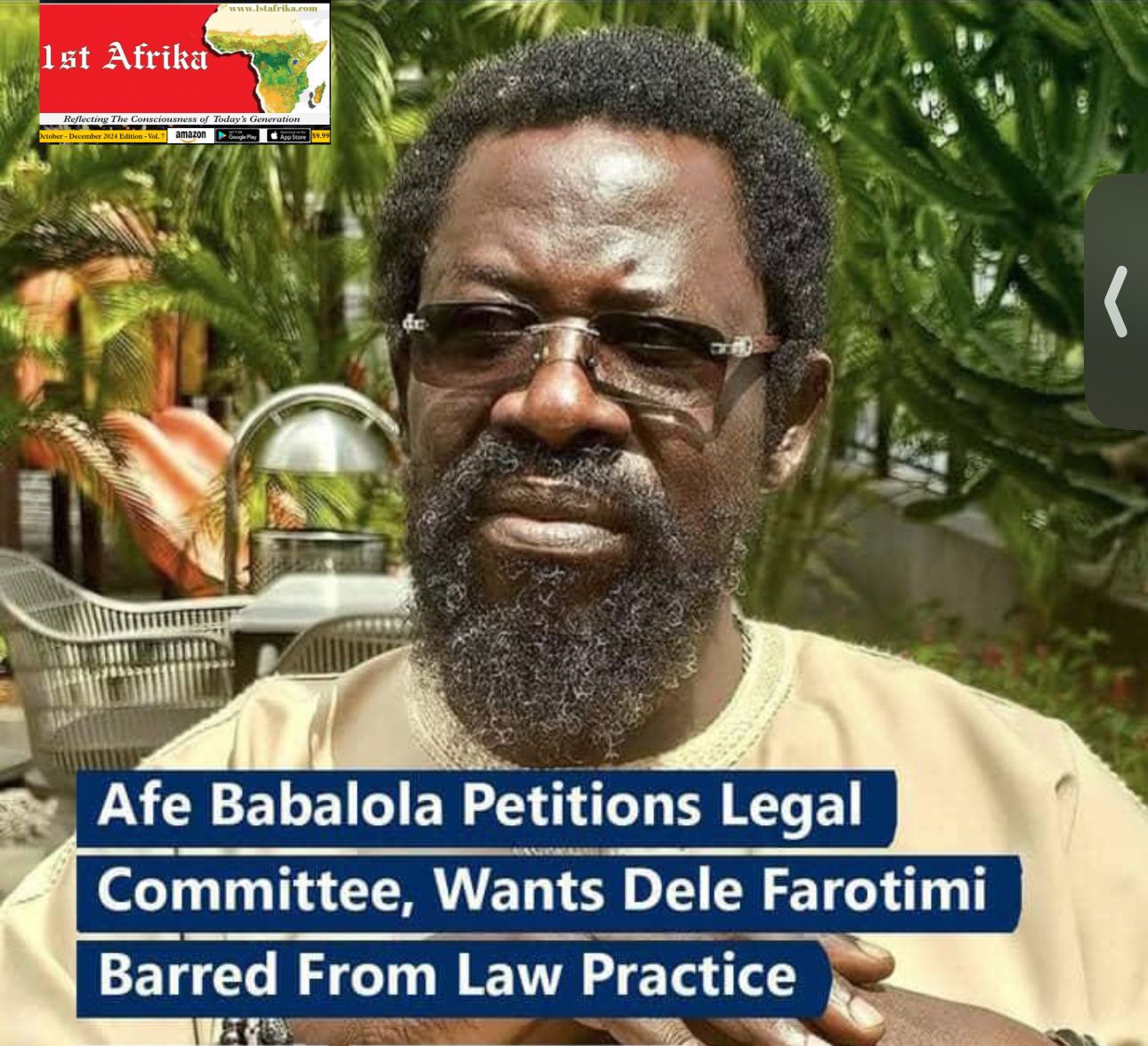 The ongoing legal dispute between Dele Farotimi, a human rights lawyer and activist, and Chief Afe Babalola, SAN, raises critical questions about professional ethics, defamation law, and the potential consequences for members of the Nigerian Bar Association (NBA). Central to this issue is whether Farotimi’s allegations, published in his book and reiterated through public commentary, could lead to his disbarment or deregistration from the legal profession in Nigeria. This analysis examines the legal, ethical, and constitutional dimensions of the case, exploring relevant statutes, precedents, and comparative international perspectives on similar legal disputes.
The ongoing legal dispute between Dele Farotimi, a human rights lawyer and activist, and Chief Afe Babalola, SAN, raises critical questions about professional ethics, defamation law, and the potential consequences for members of the Nigerian Bar Association (NBA). Central to this issue is whether Farotimi’s allegations, published in his book and reiterated through public commentary, could lead to his disbarment or deregistration from the legal profession in Nigeria. This analysis examines the legal, ethical, and constitutional dimensions of the case, exploring relevant statutes, precedents, and comparative international perspectives on similar legal disputes.In Nigeria, the regulation of legal practitioners is governed by the Legal Practitioners Act (LPA) Cap L11, Laws of the Federation of Nigeria, 2004. The act establishes the Legal Practitioners Disciplinary Committee (LPDC), a statutory body charged with investigating and disciplining lawyers for professional misconduct. According to the act, a legal practitioner may face sanctions, including suspension or outright disbarment, if found guilty of infamous conduct in a professional respect.
The Nigerian Bar Association (NBA), as the professional body of lawyers, also enforces its Code of Conduct, which aligns with the global standards of legal ethics. If allegations of defamation against Farotimi are proven to have crossed into the realm of professional misconduct particularly if they involve dishonesty, fraud, or conduct unbecoming of a lawyer disciplinary measures could be invoked.
The defamation charges against Farotimi hinge on the claims made in his book Nigeria and Its Criminal Justice System, where he accused Chief Afe Babalola of corrupting the Supreme Court in a high-profile land dispute. The Nigerian Constitution (1999) guarantees freedom of speech and expression under Section 39(1); however, this right is not absolute. Defamation laws in Nigeria, governed by the Criminal Code Act and the Cybercrimes (Prohibition, Prevention, etc.) Act 2015, criminalize false statements that harm an individual’s reputation.
For the charges against Farotimi to succeed, the prosecution must establish that: the defamatory statement was published, it directly referred to Chief Afe Babalola, the statement was false and malicious, the publication caused reputational harm.
Chief Babalola’s legal team argues that these elements are present, asserting that Farotimi’s claims were unfounded and maliciously intended to tarnish his image. Farotimi, however, has countered by invoking his right to free speech and framing his statements as matters of public interest rather than personal defamation.
Several legal precedents both within and outside Nigeria offer insights into the balance between free speech and professional accountability. In Times Newspapers Ltd v. UK (1979), the European Court of Human Rights emphasized that while freedom of expression is a cornerstone of democracy, it must be exercised responsibly, especially when reputational harm is at stake. Similarly, in the South African case of Bogoshi v. National Media Ltd (1998), the court ruled that freedom of the press does not shield malicious or reckless statements.
In Nigeria, the case of Nwosu v. Udeaja (1990) reaffirmed that a defamatory publication is actionable when it unjustly harms a person’s reputation. However, in Guardian Newspapers Ltd v. Ajeh (2011), the Nigerian Supreme Court also stressed that honest criticism of public figures, when made in good faith, is protected under free speech provisions.
The legal profession demands the highest standards of integrity and responsibility. If the LPDC concludes that Farotimi’s actions were professionally unethical, he could face disciplinary sanctions, including disbarment. However, it must be demonstrated that his conduct involved dishonesty or breach of professional duty. Merely expressing controversial or unpopular opinions, even if they are critical of senior legal professionals, may not suffice for disbarment unless evidence of intentional falsehood is established.
The case has broader implications for the legal profession and the protection of free speech in democratic societies. In many jurisdictions, including the United States and the United Kingdom, lawyers have been disciplined for defamatory statements that breach ethical rules. However, these cases often involve direct client relations or misrepresentation in legal practice, rather than public commentary on legal issues.
Historically, African legal traditions have upheld the principles of truth and accountability in public discourse. Pre-colonial African customary laws emphasized restorative justice and reconciliation, while modern legal systems incorporate defamation statutes modeled after common law principles. Notably, international organizations such as the United Nations and the African Commission on Human and Peoples’ Rights have repeatedly emphasized the need for proportionality in defamation cases to avoid chilling effects on freedom of expression.
The legal, ethical, and constitutional complexities surrounding the defamation allegations against Dele Farotimi reflect the delicate balance between free speech, professional ethics, and the rule of law. While the allegations, if proven, could trigger disciplinary proceedings under Nigerian law, such action must be guided by clear evidence of professional misconduct rather than the mere expression of controversial opinions.
Ultimately, the outcome of this case will set a critical precedent for the intersection of legal ethics, public accountability, and freedom of speech in Nigeria’s legal landscape. Whether Farotimi’s remarks constitute defamation or protected speech will depend on the legal system’s ability to navigate these nuanced issues with fairness, impartiality, and strict adherence to the rule of law.
By : Jide Adesina
1st Afrika
December, 2024
All rights reserved
www.1stafrika.com

